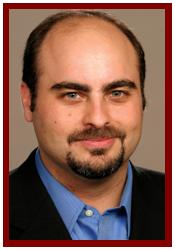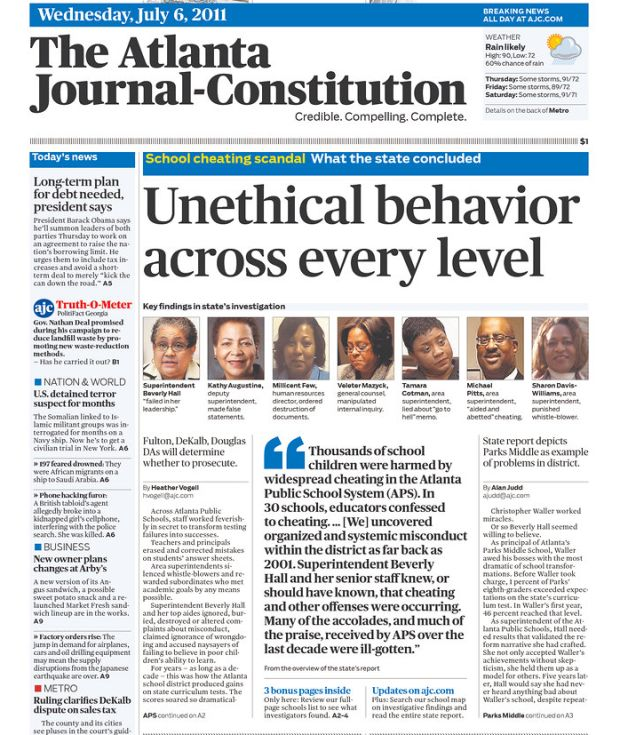 The media are full these days of stories discussing the relative value of education. Some detail the political fights in various states, such as Texas and California, over funding and control of state universities, while others discuss the failure of universities in general to educate “academically adrift” students, or the pernicious effects of the tenure system on higher education. Central to many of these discussions are attempts to evaluate education, or individual educators, on the basis of measurable quantities—student scores on standardized tests or average salaries upon graduation on the one hand, number of refereed publications or hours taught on the other.
The media are full these days of stories discussing the relative value of education. Some detail the political fights in various states, such as Texas and California, over funding and control of state universities, while others discuss the failure of universities in general to educate “academically adrift” students, or the pernicious effects of the tenure system on higher education. Central to many of these discussions are attempts to evaluate education, or individual educators, on the basis of measurable quantities—student scores on standardized tests or average salaries upon graduation on the one hand, number of refereed publications or hours taught on the other.
Frankly, I find these discussions both depressing and unenlightening. Attempts to quantify the value of an education strike me as irrelevant at best and pernicious at worst.
 Part of my objection is practical. Any quantitative measure of education is susceptible to interpretation and manipulation (literally, if one follows the growing scandal in the Atlanta public schools over cheating on standardized tests). Even if honestly gathered, such data may still not tell us what we think we want to know. Do the GPAs or the starting salaries of graduates really tell us whether those graduates received good educations, or do they just tell us about the relative success of those graduates to manage the practical aspects of life? Should we be surprised that Engineering majors make more on average than English majors? Do the number of refereed publications or the numbers of credit hours taught tell us whether a professor is an effective educator?
Part of my objection is practical. Any quantitative measure of education is susceptible to interpretation and manipulation (literally, if one follows the growing scandal in the Atlanta public schools over cheating on standardized tests). Even if honestly gathered, such data may still not tell us what we think we want to know. Do the GPAs or the starting salaries of graduates really tell us whether those graduates received good educations, or do they just tell us about the relative success of those graduates to manage the practical aspects of life? Should we be surprised that Engineering majors make more on average than English majors? Do the number of refereed publications or the numbers of credit hours taught tell us whether a professor is an effective educator?
Surely there are researchers who prolifically produce the irrelevant, just as there are teachers who produce a full load of dull and uninspiring classes every semester. Such scraps of data tell us some things, certainly, but they can only provide insight into narrow aspects of a larger whole; we need to know more if we want to know enough.
The practical objection feeds into the larger philosophical problem. Education is not easily reducible to a single result, either for the teacher or the student. To assume that it can be is, frankly, an insult to the very idea of intellectual pursuit. The actual process of education is just that, a process that extends through an individual’s lifetime. One cannot say completely at any one moment exactly how an education has or has not succeeded in shaping an individual’s life. There is an element of mystery in how it works that can elude even the most assiduous statistician. That is not something to be decried, but something to be treasured by anyone who values knowledge and teaching.
That may not sound like much of an observation to anyone who has spent any time in a classroom, or talking to different people about their memories of and attitudes toward their formal education. But it bears repeating, because in our time educational discussions have been overwhelmed by the tyranny of the measurable. Prospective students try to measure the practical advantages of one course of study over another, politicians seek the data to argue for their policy preferences, and thoughtful critics attempt to advance their arguments about the future of education at all levels by poring over the data.
Tenure and promotion decisions are made based on the accumulation of material, and armies of newly minted university administrators spend their well-compensated time obsessing over the various “metrics” that go into the Master Metric—a school’s US News ranking.
Conservatives should be especially careful when it comes to this tyranny, because if we are serious about the ineffable, spiritual aspects of education, we should not be so quick to reach for quantitative measures. Sadly, when self-defined conservatives enter these discussions, they tend to side with the quantifiers—be they Texas officials who want to draw up productivity charts to identify lazy faculty or authors such as Naomi Schaefer Riley, who denounce tenure as an unnecessary luxury and cast aspersions on academic research, claiming that professors should do more “useful” things instead. Many conservatives embrace the argument that educational institutions should be “run like businesses” and that education should be practical and useful.
Here again I have both practical and philosophical objections. Practically, one cannot avoid that different measures of productivity often clash with each other. For example, if the famous Texas spread sheet measures faculty productivity according to how many grants an individual faculty member brings in, or the number of refereed journal articles, how does one square that with Schaefer Riley’s trenchant but occasionally scattershot criticism that faculty spend too much time on specialized research that no one reads? If the only thing that matters is how many scheduled hours a professor teaches, where do we fit in the time a faculty member should spend gaining and creating new knowledge to share with students, not to mention the hours spent advising, discussing, and encouraging outside of the classroom?
 The problem, as I see it, is that too many conservatives are wrapped up in the notion that “the enemy of my enemy is my friend.” Since conservatives in general tend to view intellectuals (and especially college professors) as liberals who want to undermine American society (an unfortunate attitude that further alienates and isolates conservative-leaning intellectuals and professors), any arguments that attack college professors in general and that shake up the current university system are welcome, even if the positions are incoherent. Thus conservatives can be seen demanding that professors research less and teach more, and can also be seen decrying the terrible things professors do and say in the classroom as disconnected from real intellectual work.
The problem, as I see it, is that too many conservatives are wrapped up in the notion that “the enemy of my enemy is my friend.” Since conservatives in general tend to view intellectuals (and especially college professors) as liberals who want to undermine American society (an unfortunate attitude that further alienates and isolates conservative-leaning intellectuals and professors), any arguments that attack college professors in general and that shake up the current university system are welcome, even if the positions are incoherent. Thus conservatives can be seen demanding that professors research less and teach more, and can also be seen decrying the terrible things professors do and say in the classroom as disconnected from real intellectual work.
On an even more fundamental level, conservative insistence on practicality and business models in education undermines what should be an essential conservative value—the pursuit of knowledge as an end in itself, and the importance of cultivating an appreciation for the intellectual treasures of our culture. Groups such as ISI rightfully emphasize the need for teaching the fundamental texts and ideas of the Humanities, but these are the subjects whose value is least susceptible to measurement on a balance sheet or a list of trade skills, and which are always first in line for the chopping block in the eyes of those who seek to make higher education more businesslike and practical. Conservatives should be more careful that their attacks on what may appear to be the enemy do not end up destroying the foundations of intellectual inquiry and all they mean for our future.
There are plenty of problems in higher education. Chief among them, in my mind, is the growing chasm between the responsibility of educators to introduce students to new material and the relentless pressure to specialize. The best way to deal with that problem, and the many others, however, is not to insist on particular metrics. Conservatives, liberals, and moderates all have their particular blind spots, and they cannot be overcome by a single magic bullet. Rather, we need to expand the possible elements of evaluation, by encouraging serious discussions between and among faculty, students, and the general public about what they expect a college education to provide, what they are willing to sacrifice to get it, and how they expect to preserve the atmosphere of intellectual freedom and creativity necessary for education to happen in the first place. It will require the inclusion of a wide range of variables and principles. It will require discussion and exchange, not simply the collection of surveys. It will also require that all sides be mature enough to manage respectful disagreements without resorting to anti-intellectual posturing. Discussion is hard, and time consuming, not nearly as simple as finding one formula to solve all our problems. Nevertheless, if we are serious about the future of education, we need to overcome the tyranny of the measurable.
(Cross-posted, with permission of the author, from ISI’s American Study Center.)










Leave a Reply